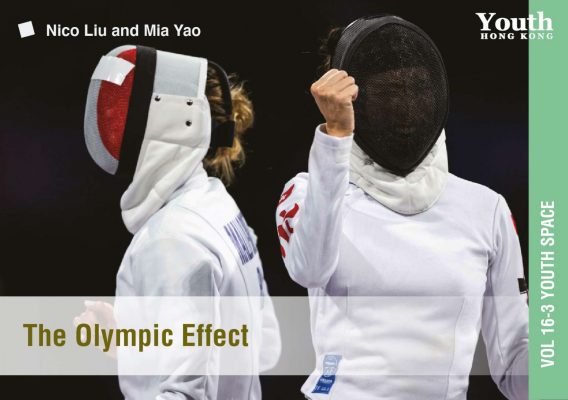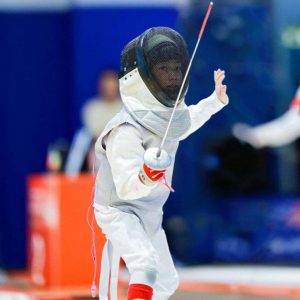//16.3 Youth Space: Sports
The Olympic Effect
by Nico Liu and Mia Yao
Hong Kong’s Olympic fencing triumphs have sparked a surge of interest in the sport among youth and adults.
Ramsey Wong, who is about to turn seven, began fencing when she was three years old because it looked “super cool.” She started to take fencing classes, long before Vivian Kong Man-wai’s gold-medal victory at the Paris Olympics.
Months after Ramsey started fencing, Hong Kong fencer Edgar Cheung Ka-long won his historic gold in the 2021 Tokyo Olympics. This historic win greatly boosted the popularity of this sport in the city, encouraging more students like Ramsey to take up fencing.
This phenomenon, termed the “Ka-long effect,” reoccurred in 2024 after Edgar and Vivian’s fencing gold medal wins at the Paris Olympics. Fencing schools in Hong Kong have since been inundated with calls from parents eager to enroll their children, some with dreams of raising the next Edgar or Vivian.
During the Olympic Games, fencing course registrations surged by tenfold, with inquiries up by hundred times compared to normal, Mr Tin from Fencing Formula told Youth Hong Kong.
Mr Ma from LEHK Fencing noted that the sport’s Olympic success has sparked significant interest among both youth and adults in Hong Kong. “Fencing was not widely popular among adults, but as they enter the workforce and earn money, many are now eager to try the sport when they have the opportunity,” he said.
As the sport’s popularity flourishes, fencing has gradually fencing has gradually transformed from an elite sport only available in prestigious schools like La Salle and St. Paul’s to being more accessible to Hong Kong’s middle class and average families. The availability of Chinese-made uniforms and equipment has led to more affordable gear, significantly lowering the barriers to entry. Despite this, fencing remains relatively expensive compared to other sports when factoring in class fees, equipment costs, and travel expenses for international competitions, according to parents.
“My daughter breaks a sword every month. A single sword can cost anywhere from hundreds to 2,000 Hong Kong Dollars,” Ramsey’s father James Wong told us. Despite the costs, he believes the investment is worthwhile because fencing not only tests individual athletic ability but also trains physical and mental resilience, observation and concentration, as well as control skills and even the ability to anticipate opponents’ moves. “Seeing my daughter work hard towards her dreams makes every expense worth it.”
Four years on, scoring in fencing competitions continues to give Ramsey great excitement and a sense of accomplishment. Her ultimate goal is to become a professional foil fencer and compete in international events like the Olympics. “If possible, I hope to achieve the same level of success as my idols, Edgar and Vivian, and win a world championship,” Ramsey said. ■



